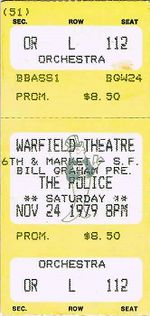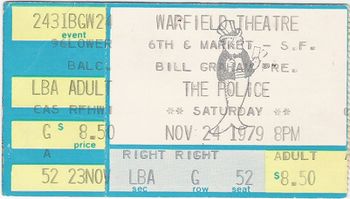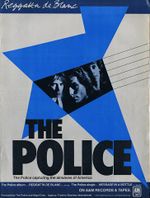Difference between revisions of "1979-11-24"
| Line 20: | Line 20: | ||
| colspan="2" align="center" | a ticket for this concert | | colspan="2" align="center" | a ticket for this concert | ||
|- style="background-color: #f9f9f9;" | |- style="background-color: #f9f9f9;" | ||
| − | | colspan="2" align="center" | [[Image:1979_11_24_ticket_Kareem_Kaddah. | + | | colspan="2" align="center" | [[Image:1979_11_24_ticket_Kareem_Kaddah.jpg|350px]] |
|- style="background-color: #f9f9f9;" | |- style="background-color: #f9f9f9;" | ||
| colspan="2" align="center" | a ticket for this concert - provided by Kareem Kaddah | | colspan="2" align="center" | a ticket for this concert - provided by Kareem Kaddah | ||
Revision as of 01:09, 21 November 2020
| 1979-11-24 | |
|---|---|

| |
| a ticket for this concert | |

| |
| a ticket for this concert - provided by Kareem Kaddah | |
| Performance summary | |
| Artist performing: | The Police |
| Tour: | 1979-1980 Reggatta de Blanc Tour |
| Venue: | Warfield Theatre |
| Location: | San Francisco, CA, USA |
| Support acts: | Pearl Harbor & The Explosions |
| Ticket prices: | US$ 8,50 |
On 1979-11-24, The Police performed at the Warfield Theatre in San Francisco, CA, USA.
Setlist
Among the songs played were:
- Next To You
- So Lonely
- Hole In My Life
- The Bed's Too Big Without You
- Roxanne
- Message In A Bottle
- Be My Girl, Sally (one of 2 encores)
Recording information
This section needs more information. Please note if an official or unofficial recording, or recording(s), is known to exist of this performance.
Trivia
This concert was reviewed in Record Mirror on December 8, 1979.
Today A&M promoted Reggatta de Blanc and Message In A Bottle with a huge one page ad in Billboard and Record World.
Pearl Harbor & The Explosions' Peter Dunne remembers this (an excerpt from his "Mystical Body" page):
" The Police, on their incessant touring schedule, came back through San Francisco a short while later. They had somehow managed to cut a new record called Reggatta de Blanc which had a song, Message In A Bottle, streaking up the charts. They were booked to play the Warfield Theatre, a 2200 seat vaudeville cum movie theater cum rock hall on Market Street. I’d seen 20,000 Leagues Under the Sea there as a kid when it was the Loew’s Warfield. We were added to the bill. Us and them. The show sold out well in advance. Drivin’, even before release, was getting significant airplay on major (and lesser) local FM stations and it seemed that we would get a fair share of the audience’s attention and love. The Police, and their well deserved popularity, notwithstanding. We loaded in early, as usual, and waited around for the headliners to show up and take their sound check. I set up in a room in the basement of the theater and practiced scales, arpeggios and chord voicings while waiting. This time we actually got a sound check. The Police, as was their custom, set up and jammed for what seemed like an eternity. They were virtually unapproachable while they were about their business, but I caught up with them downstairs in the hall near their dressing room later. They looked quite a bit different than they had while I watched them jam from the balcony of the theater. In fact, I saw three young guys, about my age, full of much of the same kind of purpose and ambition that I had. Not unapproachable at all.
“I like your new record,” I offered. I had read that Andy was unsatisfied with it but that the other two wouldn’t hear dissension about it. They had to flog it, after all.
“Really? We’re not sure about it, we did it in such a hurry.”
“No, it’s lovely, in fact it’s the first and only “new wave” record I own. You should be proud of it.”
None of these guys was new to his instrument and I felt a kinship with others who had skill but were trying to do something new with it, not just follow the previous rock norms. It was a tricky row to hoe, a veritable Scylla and Charybdis, as it were. And to succeed and not lose credibility was as hard as finding the right musical language to use. The punk/new wave style had very rigid standards, which helped to distinguish it, but which were a tad fascistic at the same time. Perhaps more than a tad. I don’t know that it could have been otherwise.
In fact, I bought Reggatta de Blanc and C’est Chic at the same time. I loved Nile Rodgers and Bernard Edwards who, of course, went on to produce rock and new wave acts but at that time were identified with disco. It was not something that I could reveal to Pearl. Pearl had her own secrets. Publicly and in the press she professed a great love of Tina Turner and all things rockabilly, but privately she confided to me that she thought Mick Jagger was the epitome of the rock and roll front man. All three, Tina, Mick and Pearl could do the sideways pony, which for me will be always be the standard by which front people are measured. Enrico Caruso? Not bad, but could he do the sideways pony?
The Warfield show with The Police went splendidly. Sting joined us down at X’s, a new dance club in North Beach afterward for a round of pogoing and letting off steam. He caught me up near the bar. “Andy raved about your playing,” he said. “And he never raves about any other guitarists.” “I must have had a good night” I laughed. And off we went to the dance floor as the dj played I Want to Be Sedated by the Ramones. Pearl was nowhere to be found. She had, in fact, taken Stewart home to her place in Mill Valley.
The press raved too. “Pearl Harbor Battles the Police” read the headline. One guy did a player by player comparison such as you might find in the sports section and went on about how I blew Andy Summers off the stage, how I was the next big thing, blah, blah, blah. This was so over the top that I sensed a bit of distance from my friends, even from David Kahne, who I suspected was waiting to see if my head would be expanding disproportionately.
The truth was I looked to people like Andy Summers, Stewart and Sting, not to copy or emulate, but to see how they used their considerable musical skills in this new style and marketplace. I respected them as musicians, which quite frankly there were not a lot of in this market at this time, and thought they were going about making their mark in the right way. At the same time, what with the new minimalistic aesthetic emerging, being thought of as a musician was not necessarily the politically correct identity. A bit of a cultural purge was going on and musicians were called Musos by the hard core in a somewhat derogatory manner. It wasn’t China by a long shot, however, with its cultural purge of all things Western, including the entire European musical tradition. There, if you spent years teaching Chopin to children, you were sent to prison. Here, you just had to be creative, and wear a bit of a disguise."
See also
This section needs more information.
External links
References
sources: tickets; review in Record Mirror - December 8, 1979; photo; ads; Peter Dunne
